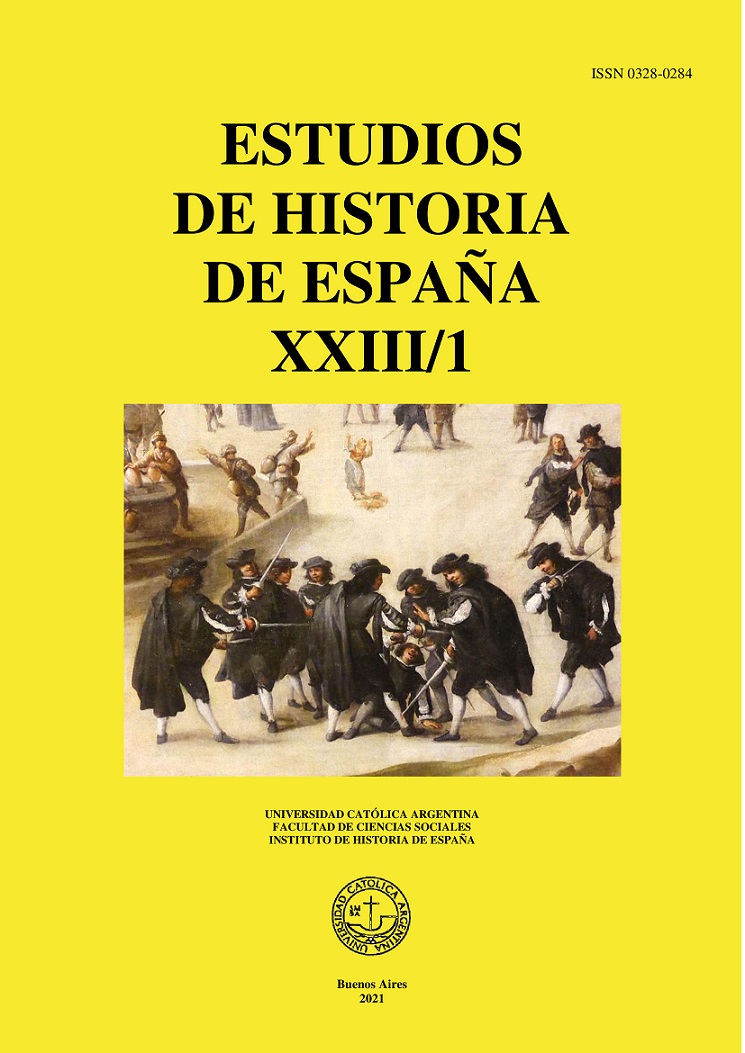Emotion as the foundation of class: Working class movement and socialism in fin-de-siecle Biscay
DOI:
https://doi.org/10.46553/EHE.23.1.2021.p39-54Keywords:
History of emotions, working class studies, socialism in Biscay, Red socialist emotional regime, miner workersAbstract
The aim of this work is to study in a new way the making of class consciousness in the miner and industrial Biscay at the end of nineteenth century. We will focus on socialist movement, due to its predominance in this process, and we will use the theoretical and methodological tools provided by the history of emotions. Our proposal is to analyze class consciousness paying attention to the emotional expressions, practices and rituals, all of them constitutive elements of what we call Red socialist emotional regime, which underpins the socialist political program in this area. This regime was defined by the peaceable behavior during the demonstrations; by a new emotional norm, the solidarity; and by the defense of the idea of worker as a human being with dignity. The attack to that notion produced indignation and rage, which were expressed through some practices, as striking. This regime was also characterized by favoring the tavern as an emotional refugee.
Downloads
References
Fuentes primarias
El Guipuzcoano. Diario liberal reformista, 1890.
El Liberal, 1914.
El Noticiero Bilbaíno, 1885, 1890.
El Socialista, 1890.
Gaceta de Madrid, 1883.
La Libertad (San Sebastián), 1890.
MAEZTU, Ramiro, “Las minas de Bilbao”, Vida Nueva, 30 de abril de 1899, pp. 1-4.
ZUGAZAGOITIA, Julián, “Triconomía obrera. Fábricas, minas y talleres”, El Liberal (Bilbao), 20 de agosto de 1922, p. 2.
Bibliografía
ABU-LUGHOD, Lila, Veiled sentiments. Honor and poetry in a Bedouin society, California, University of California Press, 1986.
AHMED, Sara, The cultural politics of emotion, Edinburgh, Edinburg University Press, 2004.
ARANA, Ignacio, El monarquismo en Vizcaya durante la crisis del reinado de Alfonso XIII (1917-1831), Universidad de Navarra, Pamplona, 1982.
BARKER, Colin, “The Making of Solidarity at the Lenin Shipyard in Gdansk” en GOODWIN, James, JASPER, James y POLLETTA, Francesca, Passionate Politics. Emotions and social movements, Chicago, Chicago University Press, 2001, pp. 175-195.
BEASCOECHEA, José María, “Jerarquización social del espacio urbano en el Bilbao de la industrialización” Scripta Nova. Revista electrónica de geografía y ciencias sociales, 146, (2003), pp.1-16.
BIESS, Frank y GROSS, Daniel (eds.), Science and Emotions after 1945, Chicago, University of Chicago Press, 2014.
BOURDIEU, Pierre, ¿Qué significa hablar? Economía de los intercambios lingüísticos, Madrid, Akal, 2008.
BURKE, Peter, “The invention of Leisure in Early Modern Europe”, Past and Present 146, (1995), pp. 136-150.
CAMPOS MARÍN, Ricardo, “El obrero abstemio. Salud moral y política en el discurso antialcohólico del socialismo español a principio de siglo”, Historia Social, 32, (1998), pp. 27-43.
CAPELLÁN DE MIGUEL, Gonzalo, “Cambio conceptual y cambio histórico. Del pauperismo a la cuestión social” Historia Contemporánea, 29, (2004), pp. 539-590.
CASTELLS, Luis, “El nacionalismo vasco (1890-1923): ¿una ideología modernizadora?”, Ayer, 28, (1997), pp. 127-162.
CASTILLO, Santiago, Reformas Sociales, Madrid, Ministerio de Trabajo y Seguridad Social, 1985.
COLLINS, Randal, “Social movements and the focus of Emotions Attention” en GOODWIN, James, JASPER, James y POLLETTA, Francesca, Passionate Politics. Emotions and social movements, Chicago, Chicago University Press, 2001, pp. 27-45.
DAMASIO, Antonio, Descartes´ Error. Emotion, reason and human brain, New York, Avon Books, 1994.
DOMENECH, Antoni, El eclipse de la fraternidad. Una revisión republicana de la tradición socialista, Barcelona, Crítica, 2004.
FEBVRE, Lucien, “Sensibility and History: How to Reconstitute the Emotional Life of the Past”, en BURKE, Peter (ed.), A New Kind of History, London, Harper Row, 1973, pp. 12-26.
FRAZER, Michael, The Enlightenment of Sympathy. Justice and the Moral Sentiments in the Eighteenth Century and Today, New York, Oxford Universtity Press, 2010.
FREVERT, Ute, Emotional lexicons: continuity and change in the vocabulary of feeling 1700-2000, New York, Oxford University Press, 2014.
FUSI, Juan Pablo, Política obrera en el País Vasco, Madrid, Taurus, 1975.
----- El País Vasco. Pluralismo y nacionalidad, Madrid, Alianza, 1990
----- “La edad de las masas”, Historia contemporánea, 4, (1990), pp. 261-272.
GIL Y FRESNO, José, Higiene física y moral del bilbaíno. Bilbao, Imprenta de Juan E. Delmas, 1871.
GIL Y FRESNO, José “Cartas de un médico viejo. Acerca del cólera”, El Noticiero Bilbaíno, 28 de julio de 1884, p. 4.
GIMENO Y AZCÁRATE, Manuel, La criminalidad en Asturias. Estadística (1883-1897), Oviedo, Escuela Tipográfica del Hospicio, 1900.
GONZÁLEZ PORTILLA, Manuel (ed.), Los orígenes de una metrópoli industrial: la ría de Bilbao vol. I, Bilbao, Fundación BBVA, 2001.
GOULD, Deborah, Moving politics. Emotion and Acts Up´s fight against AIDS, Chicago, Chicago University Press, 2009.
GROSS, Daniel, The secret history of emotion. From Aristotles Rhetoric to Modern Brain Science, Chicago, Chicago University Press, 2007.
HAKE, Sabine, The proletarian dream. Socialism, culture and emotion in Germany, 1963-1933, Berlin, DeGruyter, 2017.
HIDALGO GARCÍA DE ORELLÁN, Sara, “Emociones socialistas en la huelga minera de 1890. La formación de la conciencia de clase y el giro emocional”, Historiografías. Revista de historia y teoría, 10, (2015), pp. 31-48.
----- “Emociones y liderazgo político en la Vizcaya finisecular. Facundo Perezagua, la fuerza emocional del líder”, Sancho el Sabio, 39, (2016), pp. 67-90.
----- Emociones obreras, política socialista. Movimiento obrero vizcaíno, 1886-1915, Madrid, Tecnos, 2018.
LAZARUS, Robert, “Thoughts on the relations between emotion and cognition”, American Psychologist, 37, (1982), pp. 1019-1024.
MATT, Susan y STEARNS, Peter (eds), Doing emotions history, Chicago, University of Illinois Press, 2014.
MIRALLES, Ricardo, “La gran huelga minera de 1890: en el origen del movimiento obrero en el País Vasco”, Historia Contemporánea, 3, (1990), pp. 15-44.
NOVO LÓPEZ, Pedro, “El agua potable a domicilio y los residuos urbanos bailan un complejo pas a deux (1850-1930): una aproximación metodológica e historiográfica”, Historia contemporánea, 24, (2002), pp. 281-322.
NYE, Robert, Masculinity and male codes of Honor un Modern France, Berkeley, Berkeley University Press, 1993.
PÉREZ LEDESMA, Manuel, “El miedo de los acomodados y la moral de los obreros”, en FOLGUERA, Pilar, Otras visiones de España, Madrid, Editorial Pablo Iglesias, 1993, pp. 27-64.
RALLE, Michel, “La sociabilidad obrera en la sociedad de la Restauración (1875-1910)”, Estudios de Historia Social, Volumen 50/51, (1989), pp. 161-199.
----- “Las huelgas antes y después del 1º de mayo”, Estudios de Historia Social, vols 54/55, (1991), pp. 7-135.
REDDY, William M., The Navigation of Feeling. A framework for the history of Emotions, Nueva York, Cambridge University Press, 2001.
----- “Emotional styles and Modern forms of life” en KARAFYLLIS, Nicole, y ULSHOFER, Gotlind (eds.), Sexualized Brains: Scientific modeling of emotional intelligence from a cultural perspective, Cambridge, Cambridge University Press, 2008.
ROSALDO, Michelle, Knowledge and passion. Ilognot notions of self and social life, Cambridge, Cambridge University press, 1980.
RUZAFA, Rafael, Antes de la clase: los trabajadores de Bilbao y la margen izquierda del Nervión, 1841-1891, Leioa, Universidad del País Vasco, 1998.
SABORIT, Andrés, “Semblanza de Indalecio Prieto” El Socialista, 30 de abril 1953, pp. 3-4.
SCOTT, Joan W, “On language, gender and working-class history”, International Labor and Working-Class History, 31, (1987), pp. 1-13.
SERRANO, Carlos, “Cultura popular/cultura obrera en España alrededor de 1900”, Estudios de historia social, Volumen 4, (1989), pp. 21-32.
SIERRA ÁLVAREZ, José, El obrero soñado. Ensayo sobre el paternalismo industrial (Asturias 1860-1917), Madrid, Siglo XXI, 1990.
----- "Rough Characters": Mineros, alcohol y violencia en el Linares de finales del siglo XIX”, Historia Social, 19, (1994), pp. 77-98.
STEDMAN JONES, Gareth, Languages of Class: Studies in English working-class history, 1832-1982, New York, Cambridge University Press, 1983.
THOMPSON, Edward Palmer, The making of the English Working Class, New York, Pantheon Books, 1964 (1963).
----- “The moral economy of the English crowd in the Eighteenth century”, Past and Present, (1971), pp. 76-136.
----- Miseria de la teoría, Barcelona, Crítica, 1981.
VALDOUR, James, El obrero español, experiencias vividas (País Vasco), Bilbao, Universidad del País Vasco, 2000 (1919).
VERGARA GARCÍA, Eugenio, Datos para la topografía médica de san Salvador del Valle, Impr. Bonifacio Guzmán, Baracaldo, 1904.
Downloads
Published
How to Cite
Issue
Section
License


































 Estudios de Historia de España
Estudios de Historia de España